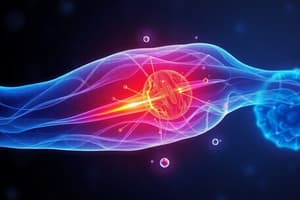Podcast
Questions and Answers
What is the first cellular response during the degeneration phase of muscle injury repair?
What is the first cellular response during the degeneration phase of muscle injury repair?
- Neutrophils infiltration (correct)
- T-lymphocytes arrival
- Fibrosis development
- Macrophage stimulation
Which factor is crucial for the successful regeneration of muscle tissue after injury?
Which factor is crucial for the successful regeneration of muscle tissue after injury?
- High levels of fibrosis
- Maximal inflammation response
- Intact basement membrane (correct)
- Presence of cytokines
What role do macrophages play in the healing process of muscle injury?
What role do macrophages play in the healing process of muscle injury?
- They promote fibrosis
- They stimulate satellite cell migration (correct)
- They cause necrosis
- They block angiogenesis
Which effect do cytokines NOT have on satellite cells during muscle repair?
Which effect do cytokines NOT have on satellite cells during muscle repair?
How long does it typically take for regeneration to occur after a muscle injury?
How long does it typically take for regeneration to occur after a muscle injury?
What critical outcome may occur if the basement membrane is compromised during healing?
What critical outcome may occur if the basement membrane is compromised during healing?
What is the significance of T-lymphocytes during the inflammation phase of muscle injury repair?
What is the significance of T-lymphocytes during the inflammation phase of muscle injury repair?
What aspect of muscle healing do chemotactic agents primarily influence?
What aspect of muscle healing do chemotactic agents primarily influence?
Which of the following is NOT a role of cytokines during muscle repair?
Which of the following is NOT a role of cytokines during muscle repair?
What type of healing occurs due to an adequate response involving remodeling after regeneration?
What type of healing occurs due to an adequate response involving remodeling after regeneration?
Flashcards are hidden until you start studying
Study Notes
Muscle Strain and Contusion Repair Process
- Hemostasis and hematoma formation initiate repair after injury.
- Degeneration phase includes necrosis where neutrophils are the first responders.
- Chemotactic agents are released to attract inflammatory mediators to the injury site.
- Inflammation starts within 24-48 hours post-injury, characterized by:
- Phagocytosis of cellular debris by immune cells.
- Macrophages stimulate satellite cells to migrate, differentiate, and release various cytokines.
- T-lymphocytes take over after macrophages decrease, continuing cytokine release.
- Regeneration takes place approximately 6-8 weeks after injury, followed by tissue remodeling.
- Fibrosis may develop, potentially leading to less functional muscle tissue.
Role of the Basement Membrane in Muscle Healing
- The basement membrane's integrity is crucial for muscle regeneration.
- Satellite cell division is vital for maintaining an intact basement membrane:
- Facilitation of fusion between satellite and myogenic cells.
- Integration with remaining muscle fibers for repair.
- A compromised basement membrane results in fibrosis, which:
- Preserves the structural integrity of muscle but lacks functional capacity.
- Increases the likelihood of re-injury.
Effects of Cytokines on Satellite and Muscle Cells
- Cytokines enhance resistance to oxidative stress, aiding in cell survival.
- They can block myofibrogenesis, contributing to improved muscle healing.
- Promote proliferation, leading to increased cell division in repair processes.
- Facilitate differentiation, resulting in the fusion of cells with existing myofibers.
- Stimulate angiogenesis, enhancing vascular supply to newly formed muscle cells.
Studying That Suits You
Use AI to generate personalized quizzes and flashcards to suit your learning preferences.




